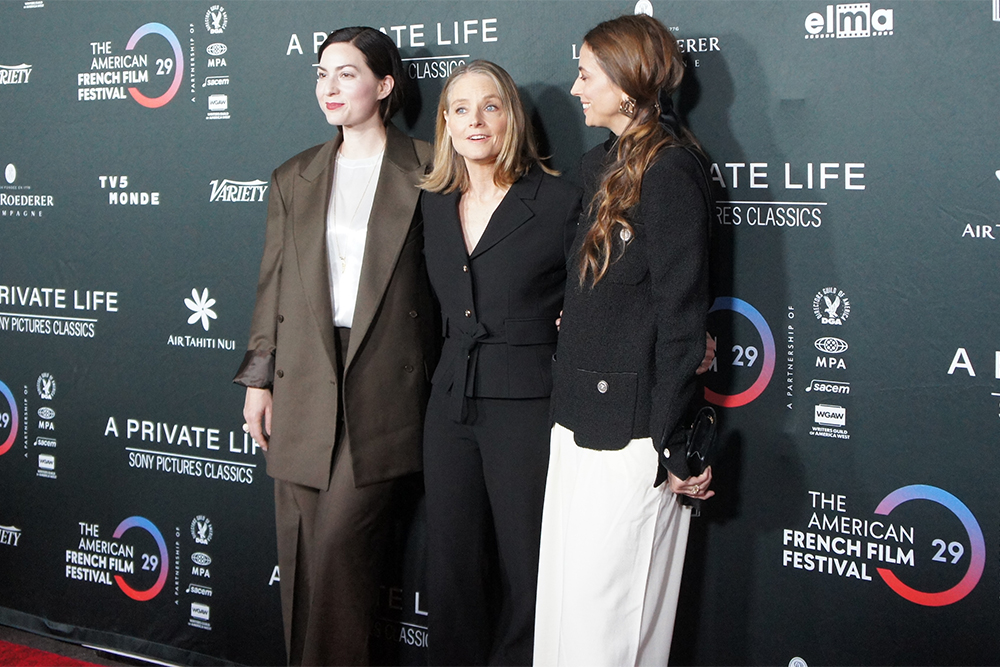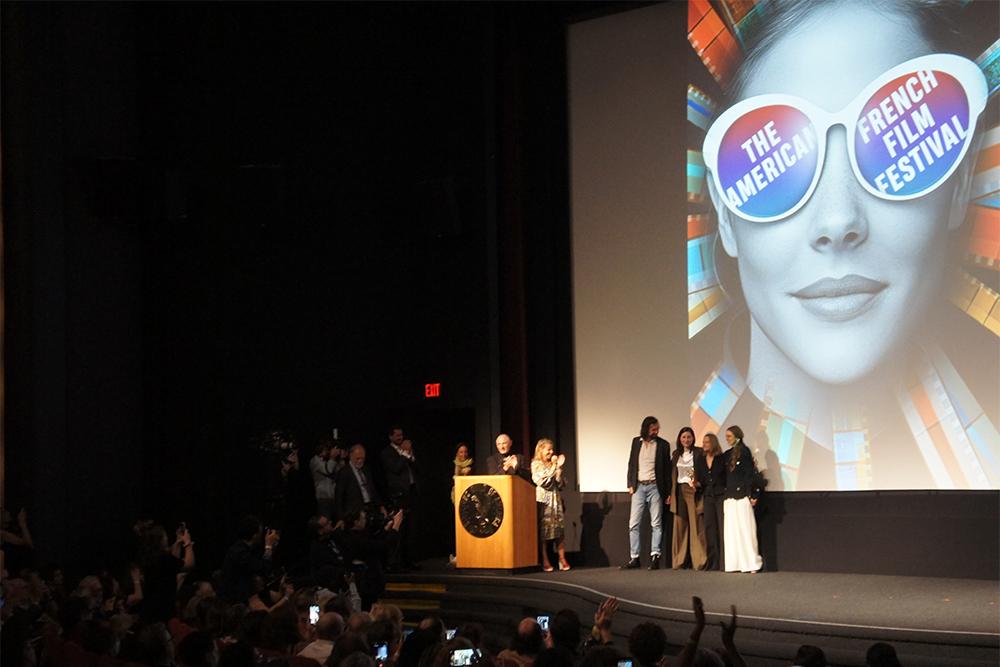Festivals - The American French Film Festival 2025 : Jodie Foster’s Life Achievement Award crowns an opening devoted to Franco-American storytelling
By Mulder, Los Angeles, Hollywood, Directors Guild of America Theatre, 28 october 2025

The 29th edition of the French American Film Festival opened last night with the elegance and emotion that only this Los Angeles event can offer. At the heart of this celebration of Franco-American cinematic ties was a memorable moment: Jodie Foster received the prestigious Life Achievement Award, recognizing a career that has left its mark on modern cinema across continents. The award was presented by Cécile Rap-Veber, CEO of SACEM, who highlighted Jodie Foster's unique connection to French culture and her lifelong commitment to storytelling that transcends borders.
There was something poetic about seeing Jodie Foster on stage at the DGA Theater, in front of an audience that has followed her evolution from her early beginnings as a child star to her status as one of Hollywood's most intelligent and respected artists. The applause was long, heartfelt, almost familial. For many in attendance, this award was not only a recognition of her longevity, but also a tribute to her integrity. Foster, who is fluent in French and has long been admired in France for her dual sensibilities, both analytical and emotional, embodies the very dialogue that the American French Film Festival was created to celebrate. Having studied at the Lycée Français in Los Angeles and then at Yale University, she has often said that her French education shaped her discipline, her curiosity, and her love of cinema as an art form rather than a career.

The choice of Jodie Foster as this year's honoree was also a significant nod to her deep and enduring relationship with French cinema. In 2025, she starred in Vie privée, a French-language psychological thriller directed by Rebecca Zlotowski, alongside Daniel Auteuil. The film, chosen to open the festival, represents a return to her roots: the actress who once dubbed herself in the French versions of her English-language films now plays the lead role in a language she has mastered since childhood. This bilingual fluency has always been more than just linguistic: it reflects Jodie Foster's ability to navigate between two worlds, between the artistic rigor of European cinema and the narrative grandeur of Hollywood.
The evening was also an opportunity to recall Jodie Foster's extraordinary career. From her unforgettable role as Iris in Martin Scorsese's Taxi Driver at the age of twelve to her Oscar-winning performances in The Accused and The Silence of the Lambs, Jodie Foster has continually redefined what it means to grow up in the spotlight without losing her bearings. Her achievements as a director—Little Man Tate, Home for the Holidays, The Beaver, and Money Monster—have proven that her artistic talent extends beyond acting. Few actors have managed to transition so naturally from acting to directing and producing, while retaining their creative freedom and refusing to conform to Hollywood's expectations of celebrity.

When Cécile Rap-Veber presented her with the award, she praised Jodie Foster not only for her mastery of the screen, but also for her unwavering commitment to artistic truth. The moment resonated throughout the room when a visibly moved Jodie Foster spoke of her enduring affection for France, recalling her first visit to Cannes as a teenager and how the French audience treated her not as a star, but as an artist. “France taught me to think, to doubt, to seek out nuances,” she said. “It gave me permission to be complex.”
Beyond the tribute to Foster, this edition of the American French Film Festival once again confirmed its role as a cultural bridge between Paris and Los Angeles. Founded in 1996 as COLCOA, the event has become the largest French film festival in the United States, welcoming more than 20,000 participants each year, including journalists, industry professionals, and film lovers. Over the course of a week, more than seventy French-language films and series will be screened, offering a glimpse into the vitality and diversity of contemporary French-language storytelling. In addition to Vie privée, other highlights include Richard Linklater's Nouvelle Vague, which revisits the filming of Jean-Luc Godard's À bout de souffle, Pierre Niney's Guru, and Thierry Klifa's La Femme la plus riche du monde, a Shakespearean tale of family and ambition.

The atmosphere seems particularly charged this year, with collaborations between French and American creatives reaching unprecedented heights. From Antony Cordier's Middle Class to Enya Baroux's Bon voyage, Marie (On ira), the festival bears witness to the mutual fascination between the two film cultures. These exchanges are not only artistic, they are deeply human and reflect a shared belief that cinema remains one of the few languages capable of bringing different points of view together.
At the end of the evening, the image of Jodie Foster holding her award remained etched in everyone's minds. It was not a symbol of the end of a career, but rather of its ongoing evolution, a reminder that true art is tireless, multilingual, and resolutely personal. For a festival founded on dialogue between nations, paying tribute to her was tantamount to honoring that very spirit. The applause she received was not only for the films she has made, but for the way she has lived them, each one a quiet manifesto of reflection, empathy, and resilience.
With the 2025 French American Film Festival, Los Angeles became, for one luminous evening, a little piece of Paris. And Jodie Foster, who has always been a bridge between worlds, proved that the most powerful stories in cinema are those that continue to cross borders.
Photos and video : Sophie Janinet

